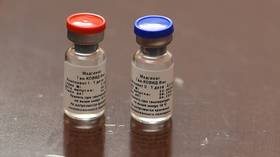'Sputnik V' worthy of Nobel Prize? Two Russian MPs think developers of world’s first Covid-19 vaccine should be recognised in 2021

The developers of Russia’s pioneering vaccine against coronavirus should be nominated for the 2021 Nobel Prize in Science, according to two Russian politicians. Named Sputnik V, it is the first to be registered in the world.
The creators of the formula, from Moscow’s Gamaleya Institute of Epidemiology and Microbiology, were the first to complete a vaccine against the virus that has devastated the globe, and continues to have a dramatic effect on the world economy. Parliamentarian Leonid Ogul believes the discovery will benefit everyone around the world, and they should therefore be rewarded.
“The invention of a vaccine against a new coronavirus infection … is a real breakthrough in the field of science and medicine,” said Ogul. “And, of course, I am very glad that this breakthrough was provided by our scientists.”
Also on rt.com Russia's 'Sputnik V' Covid-19 vaccine may prove effective, but don’t expect it to instantly end pandemic, Lancet author tells RTOgul is the deputy chairman of the State Duma Health Protection Committee, and a member of the ruling United Russia party. In the 1980s, he studied medicine, and between 2005 and 2012, was the chief physician at the Astrakhan Clinical Maternity Hospital. His proposal was supported by fellow politician Boris Mendelevich, who called the vaccine “truly a world breakthrough.”
Sputnik V is just one of a multitude of Covid-19 vaccines being produced in Russia. The second, produced by the Siberia-based Vector lab, is due to be registered by mid-October. On Wednesday, the country's Federal Antimonopoly Service announced that one dose of any coronavirus vaccine would cost less than 1,000 rubles ($13).
On August 11, Russian President Vladimir Putin announced that the country had registered the world’s first Covid-19 vaccine. It is currently in its third and final stage of clinical trials, involving 40,000 volunteers. The vaccine has been criticized by some Western countries as being unsafe due to its supposedly too rapid development and improper testing. However, at the start of September, respected British medical journal The Lancet published a study by the developers of the vaccine, showing it to be 100 percent effective, producing antibodies in all 76 participants in early-stage trials.
If you like this story, share it with a friend!















